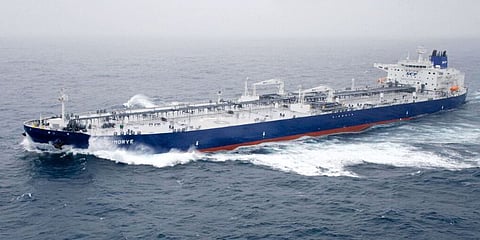OPINION | New EU sanctions will reshuffle global diesel shipping routes
New European Union sanctions targeting Russia's oil industry will reshuffle global diesel flows for the second time since 2022, adding pressure to an already red-hot market.
Diesel prices have proven surprisingly resilient so far this year. US President Donald Trump's sweeping tariff announcement in April sparked concerns that global economic and trade activity was about to decelerate sharply. But these fears failed to materialize after Trump rowed back many of these threats and engaged in trade negotiations.
The diesel market is seen as a proxy for global economic activity because the fuel is mostly used in trucks, ships and power generators as well as agricultural and industrial machinery. In Europe, around a quarter of the passenger car fleet runs on diesel, a significantly higher proportion than in other regions.
US diesel demand, based on a four-week average, has been nearly five per cent higher so far in 2025 than a year ago at 3.8 million barrels per day, according to the Energy Information Administration. Meanwhile, India’s diesel consumption in May climbed 2.1 per cent from a year earlier and China's demand appeared to be strong in June, judging by high refinery crude processing.
This is a far cry from the weak environment many imagined we might be seeing after Trump escalated his global trade war.
Low stocks
One major support for refining margins in recent months has been low diesel stocks. Combined inventories of diesel in the United States, Europe and Singapore are around 20 per cent below their 10-year average. Diesel stocks typically build during the northern hemisphere summer, when refinery output is at its highest.
Beyond the mixed demand picture, there are a host of other reasons for the slow diesel inventory build.
These include unplanned refinery outages, such as Israel's 197,000-barrels per day refinery in Haifa that was hit during the 12-day war with Iran in June, and the closure of the 113,000-bpd Lindsey refinery in northeast England following its owner’s bankruptcy.
The global shortage in heavy and medium crude oil grades, which have higher diesel yields, has further limited refining output. The shortage is the result of US sanctions on Venezuelan crude exports, a drop in Canadian output due to wildfires and lower exports of those grades by OPEC members.
EU sanctions
The outlook for diesel was further complicated last week after the EU adopted its 18th package of sanctions against Russia over its war in Ukraine.
The measures, aimed at limiting Moscow’s revenue from oil exports, included an import ban on refined products made from Russian crude. The ban, which would likely kick in next year, seeks to close a loophole that Russia has been exploiting since the EU halted most imports of the country’s crude and refined products in the wake of Moscow’s invasion of Ukraine in February 2022.
Russia accounted for 40 per cent of Europe's diesel imports in 2021, representing nearly a quarter of the region's total consumption.
To address the shortfall following the 2022 ban, Europe increased diesel imports from China, India and Turkey. At the same time, those three countries sharply increased imports of cheap Russian crude oil, which meant Europe was effectively buying products made from Russian feedstock.
Indian refiners, which accounted for 16 per cent of Europe's imports of diesel and jet fuel last year, are set to be particularly hard hit by the latest ban, as 38 per cent of India's crude imports in 2024 were from Russia, according to Kpler data.
The ban would likely have a smaller impact on imports by Turkey, where Russian crude tends to be used by refineries that supply the domestic market. Plants that export fuel to Europe tend to process non-Russian crude.
The main winners will likely be Gulf states. The new EU ban exempts countries that are net exporters of crude, even if they import Russian oil. This would allow refineries in Saudi Arabia, the United Arab Emirates and Kuwait to increase exports to Europe, taking market share from Indian competitors.
Market rejigging
The most likely outcome from these new sanctions, whose details have yet to be specified, is a reorganization of global diesel shipping flows.
Indian refiners, including the giant 1.2 million Reliance refining complex in Jamnagar, will need to find new outlets for their fuels. This will likely include markets in Africa, where Indian operators would be competing for market share with Nigeria’s newly-built 650,000-bpd Dangote refinery, the continent's largest.
At the same time, Middle Eastern refiners will direct more diesel towards Europe and less fuel towards closer Asian markets. This, in turn, will likely lead to higher freight costs – and that could ultimately push up prices at the pump in Europe.
This situation would get even more complicated if President Trump follows through on the threat to hit countries that buy Russian oil with a 100 per cent tariff if Moscow doesn’t agree to stop the fighting in Ukraine by September.
This all means that even if oil demand begins to falter, the combination of low global diesel inventories and tightening sanctions on Russia will likely support diesel prices and refining margins in the months ahead.
(Editing by Emelia Sithole-Matarise)


